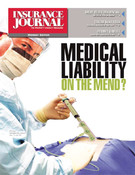Despite engaging in the longest session in Illinois history, state legislators headed home this summer leaving a crucial bill to reform the state’s workers’ compensation system in limbo.
Lawmakers may consider the proposal when they return to Springfield for the fall veto session in November. In the meantime, employers, trial lawyers, and organized labor are engaged in furious grassroots campaigns to convince legislators to pass or kill the measure.
HB 805 attempts to hold the line on workers’ compensation costs by prohibiting medical providers from billing injured claimants when there is a dispute over medical care and costs (so-called “balance billing,”), establishing a medical fee schedule and implementing tough anti-fraud provisions. Unfortunately, the bill would also significantly increase benefits across the board and require insurers to pay medical bills—even incomplete ones—within 60 days of receipt from the injured workers’ health care providers. When you add it all up, HB 805’s costs far outstrip its savings, which means that workers’ compensation costs in the state would continue to increase.
The bill appeared headed for passage earlier in the session thanks to the support of both business and labor. However, when the city of Chicago—a powerful force in Illinois politics—took a closer look at what the legislation would cost the city, it opposed the measure. This triggered other businesses to reconsider their position and support for the bill began to splinter, dimming its chances for passage.
Illinois employers—like those in many states across the country—are looking for relief from rising workers’ compensation rates. However, in its current form, HB 805 does not balance cost savings with the additional benefits proposed in the measure. In fact, employers may be disappointed when they discover that the bill does not reduce costs, but actually increases them without significantly improving coverage or care for injured workers. That’s why the Property Casualty Insurers Association of America—an organization that represents insurers writing more than 44 percent of the workers’ compensation insurance in Illinois and whose members also purchase this coverage—opposes the measure.
HB 805 contains both positive and negative provisions. The bill would prohibit balance billing, establish a medical fee schedule, and institute tough anti-fraud language—all proven methods to control workers’ compensation costs. On the minus side, the bill would require payment of a medical bill within 60 days of receipt with no requirement that it be a complete bill. The measure would also increase minimum benefits, increase the benefit rate for permanent partial disability, and double the maximum for loss of earning capacity benefits.
Employers and insurers are strong supporters of the balance billing and medical fee schedule provisions. Balance billing is an issue of fairness to employees and the overwhelming majority of states do not allow it. In addition, the experience in other states has shown that a well-designed fee schedule along with tools to address over-utilization lowers medical costs.
One important component missing from HB 805 is a provision dealing with utilization. Experience in other states shows that the impact of a fee schedule without means to control utilization does not result in real savings. Instead, many providers change the way they practice—requiring more patient visits, more procedures and separating out more charges—to offset much of the fee schedule savings.
While the fee schedule and balance billing language are important first steps, the expectation that they will offset the large increases in benefits will almost certainly prove to be an illusion.
The impact of the benefit increases will be greater for certain types of industries and employers. Companies in industries such as agriculture and construction will be hardest hit by the benefit increases. Businesses are concerned about the impact of these changes on classes of employers who have few opportunities to bring employees back to work. The bill does not address the potential incentive for employees to opt for loss of earning capacity awards.
There are other problems with the legislation. Most notably the new penalties would encourage insurers to pay questionable claims to avoid imposition of penalties later. The impact will be greater because the bill explicitly allows penalties for failure to pay for medical care, vocational rehabilitation, and temporary partial. HB 805 also provides for an interest rate on unpaid medical claims that is far above market interest even if the provider fails to provide necessary documentation. These penalties open up new avenues to game the system and will increase costs in the long run.
The fact that many of the state’s major employers and business trade organizations are split on the proposal should, in itself, send a powerful message to legislators that this bill needs a more thorough review. Illinois employers must take a careful look at the potential impact of the measure on their own companies’ bottom lines and urge legislators to bring all parties—employers, labor and insurers—to the table to develop a solution that protects workers and controls costs. In its current form, HB 805 simply promises more than it can deliver.
Laura Kotelman is regional manager and senior counsel for PCI.
Was this article valuable?
Here are more articles you may enjoy.


 Insurance Issue Leaves Some Players Off World Baseball Classic Rosters
Insurance Issue Leaves Some Players Off World Baseball Classic Rosters  A 10-Year Wait for Autonomous Vehicles to Impact Insurers, Says Fitch
A 10-Year Wait for Autonomous Vehicles to Impact Insurers, Says Fitch  AIG Underwriting Income Up 48% in Q4 on North America Commercial
AIG Underwriting Income Up 48% in Q4 on North America Commercial  Nine-Month 2025 Results Show P/C Underwriting Gain Skyrocketed
Nine-Month 2025 Results Show P/C Underwriting Gain Skyrocketed 


